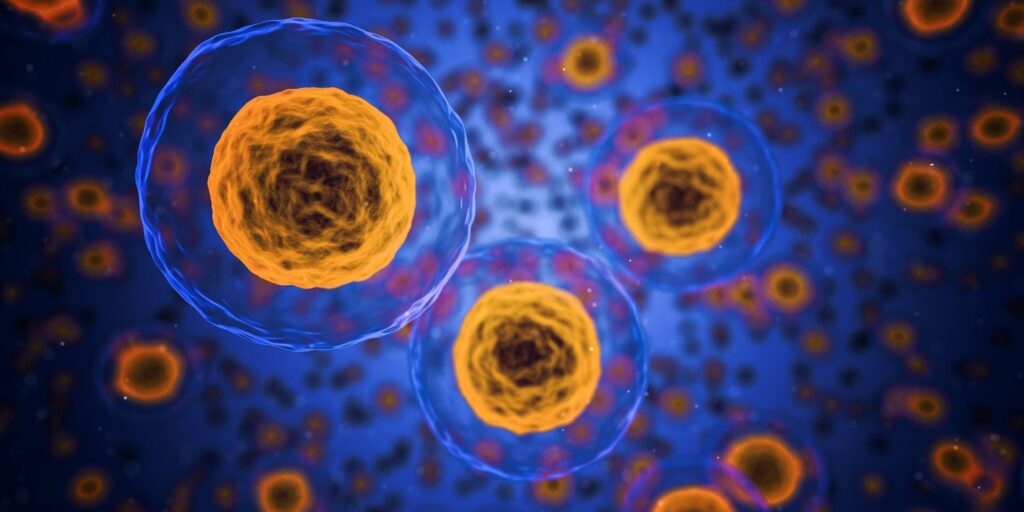
Parkinson’s disease is a neurological disorder that affects millions of people worldwide. It is characterized by the progressive loss of dopaminergic neurons in the brain. The loss of these neurons leads to motor and non-motor symptoms such as tremors, rigidity, bradykinesia, and cognitive impairments.
While the exact cause of Parkinson’s disease is still unknown, researchers have made significant progress in understanding its different aspects. They’re looking at vital cellular processes that could contribute to the development and progression of this debilitating condition. One such process is autophagy.
What is Autophagy?
Autophagy is a fundamental cellular process that helps maintain a healthy cellular environment by removing damaged or dysfunctional components. It acts as a quality control mechanism and plays a crucial role in recycling cellular materials. A key event in autophagy is the formation of a double-membrane structure called an autophagosome. Autophagosome first appears as a cup-shaped structure, which then expands to engulf cellular components targeted for degradation. It then fuses with a lysosome, which is an organelle responsible for cellular waste disposal. Inside the lysosome, the targeted cellular components are broken down into their basic building blocks for recycling.
Dysfunction of Autophagy in Parkinson’s Disease
Emerging evidence suggests that dysfunction of autophagy contributes to the pathogenesis of Parkinson’s disease. Autophagy dysfunction can lead to the accumulation of toxic protein aggregates, such as alpha-synuclein, in the brain cells of Parkinson’s patients. These aggregates are a hallmark of the disease and are thought to contribute to neuronal damage and death of dopaminergic neurons.
The Role of Genetic Mutations
Genetic mutations associated with Parkinson’s disease have also been linked to the autophagy process. Mutations in genes like PARKIN, PINK1, and DJ-1 disrupt normal autophagy events, impairing the clearance of damaged proteins and organelles. This impairment further contributes to the accumulation of toxic aggregates and the degeneration of dopaminergic neurons.
Related article: What Genes are Linked to Parkinson’s Disease?
Therapeutic Potential of Targeting Autophagy
Understanding the connection between autophagy and Parkinson’s disease has opened up new avenues for therapeutic interventions. Research suggests that modulating the autophagy process could potentially help clear the protein aggregates and restore a healthy cellular environment in affected brain regions. Several studies have shown promising results with autophagy-enhancing compounds in animal models of Parkinson’s disease. Rapamycin and trehalose are such compounds that have been extensively used in Parkinson’s research.
Current Research and Future Directions
Unraveling the Complexities
While significant progress has been made in uncovering the role of autophagy in Parkinson’s disease, many questions still remain. Researchers are working to decipher the intricate molecular mechanisms underlying autophagy dysregulation and its specific contribution to the disease. Understanding these mechanisms allows novel therapeutic intervention targets to be identified and developed.
Enhancing Autophagy as a Potential Treatment
Promoting autophagy flux and enhancing the clearance of protein aggregates are promising strategies for developing disease-modifying therapies. Researchers are exploring various approaches, including small molecules and gene therapy, to target autophagy and restore cellular balance in Parkinson’s disease.
Personalized Medicine and Precision Therapeutics
Advances in genomics and personalized medicine are paving the way for tailored treatments in Parkinson’s disease. By identifying genetic variations and molecular signatures associated with autophagy dysfunction, researchers aim to develop precision therapeutics that can address individual patients’ specific needs. This approach holds the potential to improve treatment outcomes and reduce side effects.
Conclusion
In conclusion, autophagy plays a crucial role in the development and progression of Parkinson’s disease. Dysfunction of this process leads to the accumulation of toxic protein aggregates and contributes to the degeneration of dopaminergic neurons in the brain of Parkinson’s patients. The identification of genetic mutations associated with autophagy dysfunction has provided valuable insights into the underlying mechanisms of the disease. Furthermore, the therapeutic potential of targeting autophagy offers hope for developing novel treatments that can modify the course of Parkinson’s disease.

Do you have any studies on fasting or intermittent fasting with Parkinson’s? Since you can reach autophagy after a certain time fasting. But how well does this work when on medication and is it safe?
Tnx
How can those of us who have been diagnosed as parkinsonianfaciltate this process
What can those of us who have been diagnosed with Parkinson’s be actively involved with finding solutions to having this disease be of productive use?
Thank you for your thoughtful question! Being actively involved in finding solutions and improving the management of Parkinson’s disease can be both empowering and impactful. Here are a few ways you might get involved:
Participate in Clinical Trials: Many research studies are looking for participants to test new treatments and therapies. Joining a clinical trial can contribute to the advancement of medical knowledge and potential new treatments.
Engage in Support Groups: Connecting with others who have Parkinson’s can provide emotional support and practical advice. It’s also an opportunity to share experiences and advocate for better resources and treatment options.
Advocate for Research and Policy Changes: Supporting organizations that fund Parkinson’s research or advocate for policy changes can help drive progress. Consider joining advocacy groups or participating in fundraising events.
Stay Informed: Keeping up with the latest research and treatment options can help you make informed decisions about your own care and contribute to discussions within the community.
Share Your Experience: Writing about your journey or speaking at events can raise awareness and provide valuable insights to researchers and healthcare professionals.
Your involvement can make a significant difference, not only for yourself but for the wider Parkinson’s community. If you have more questions or need guidance on how to get started, feel free to ask!